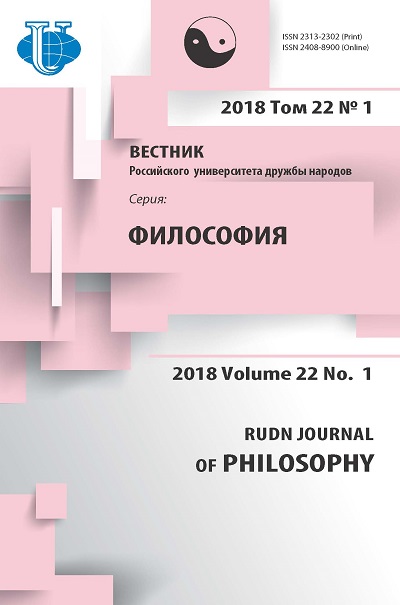Creating of Hinduism’s Image in Religiosus-Philosophical Thoutht of the Bengal Renaissance
- Authors: Skorokhodova T.G1
-
Affiliations:
- Penza State University
- Issue: Vol 22, No 1 (2018)
- Pages: 18-29
- Section: HISTORY OF INDIAN PHILOSOPHY
- URL: https://journals.rudn.ru/philosophy/article/view/18138
- DOI: https://doi.org/10.22363/2313-2302-2018-22-1-18-29
Cite item
Full Text
Abstract
Based on the sources on religious-philosophical thought of the Bengal Renaissance (XIX - early XX century), author represents the process and results of creating of the Hinduism’s image by Brahmo Samaj leaders (Rammohun Roy, Debendranath Tagore, Keshubchandra Sen) and Neo-Hindu thinkers (Bankimchandra Chattopadhyay, Swami Vivekananda). Perceived from European orientalists, the term ‘Hinduism’ was filled the meanings and content by Bengal thinkers according to the epoch’s needs. For explaining of the features of the image construction method and results, multiple influences on Bengali thinkers are described, such as the influences of traditional Sanskrit education and intellectual culture, caste consciousness, Islam, Christianity, European orientalism and scientific rationalism. Using hermeneutical, axiological and comparative methods, the Bengal thinkers had created the image of Hinduism, which contained the experience of critical analysis of indigenous religious trends and the experience of creation of ‘ideal type’ (M. Weber) of native religion. General image of Hinduism has two sides in representation of positive and negative facets both for Indians and for the World.
About the authors
Tatiana G Skorokhodova
Penza State University
Author for correspondence.
Email: skorokhod71@mail.ru
доктор философских наук, кандидат исторических наук, доцент, профессор кафедры «Теория и практика социальной работы»
40, Krasnaya Str., 440026, Penza, Russian FederationReferences
- Dasgupta Subrata. Awakening: the Story of the Bengal Renaissance. Noida: Random house Publishers; 2010.
- Dasgupta Subrata. The Bengal Renaissance: Identity and Creativity from Rammohun Roy to Rabindranath Tagore. Delhi: Permanent Black; 2012.
- Skorokhodova TG. The Bengal Renaissance: Idea, Term and System of Symbolical Description. Modern Research Studies: An International Journal of Humanities and Social Sciences. December 2015;2(Iss.4):738-768. Available from: [http://files.hostgator.co.in/hostgator201172/ file/2015020404.pdf].
- Dalmia V., von Stietencron H. (Eds.) Representing Hinduism. The Construction of Religious Tradition and National Identity. New Delhi: Thousand Oaks, Calif., Sage Publications; 1995.
- Soherwordi Syed Hussain Shaheed. Hinduism - A Western Construction or an Influence? South Asian Studies: A Research Journal of South Asian Studies. 2011;1(26):203-214.
- Roy Raja Rammohun. The English Works / Ed. by J.C. Ghose. In 4 vols. New Delhi: Cosmo; 1982.
- Halbfass W. India and Europe. An Essay of Philosophical Understanding. Albany: SUNY Press; 1988.
- Skorokhodova TG. Understanding of Other in the Bengal Renaissance’s Philosophy. Voprosy filosofii (Questions of Philosophy). 2010; 2. (In Russ).
- Naravane VS. Modern Indian Thought. N.Y.: Asia; 1964.
- Tagore Devendranath. The Autobiography. Transl. from Original Bengali by Satyendranath Tagore and Indira Devi. Calcutta: S. C. Lahiri & Co.; 1909.
- Keshub Chunder Sen in England. Calcutta: Navavidhan Publications Committee; 1938.
- Robertson BC. Raja Rammohun Roy. The Father of Modern India. New Delhi: Oxford University Press; 2001.
- Müller FM. Collected Works. Vol. X. Ramakrishna, His Life and Sayings. L.: Longman & Green; 1910.
- Chatterjee BCh. Sociological Essays; Utilitarianism and Positivism in Bengal. Transl. & Ed. by S.N. Mukherjee, M. Maddern. Calcutta: Wild Peony; 1986.
- Collet SD (and Stead FH). The Life and Letters of Raja Rammohun Roy. Ed. by DK Biswas and RCh Ganguli. 3rd ed. Calcutta: Sadharan Brahmo Samaj; 1962.
- Vivekananda Swami. Complete Works. Mayavati Memorial Edition. 12th ed. 9 vols. Mayavati - Almora: Advaita Ashrama; 1998-2002.
















